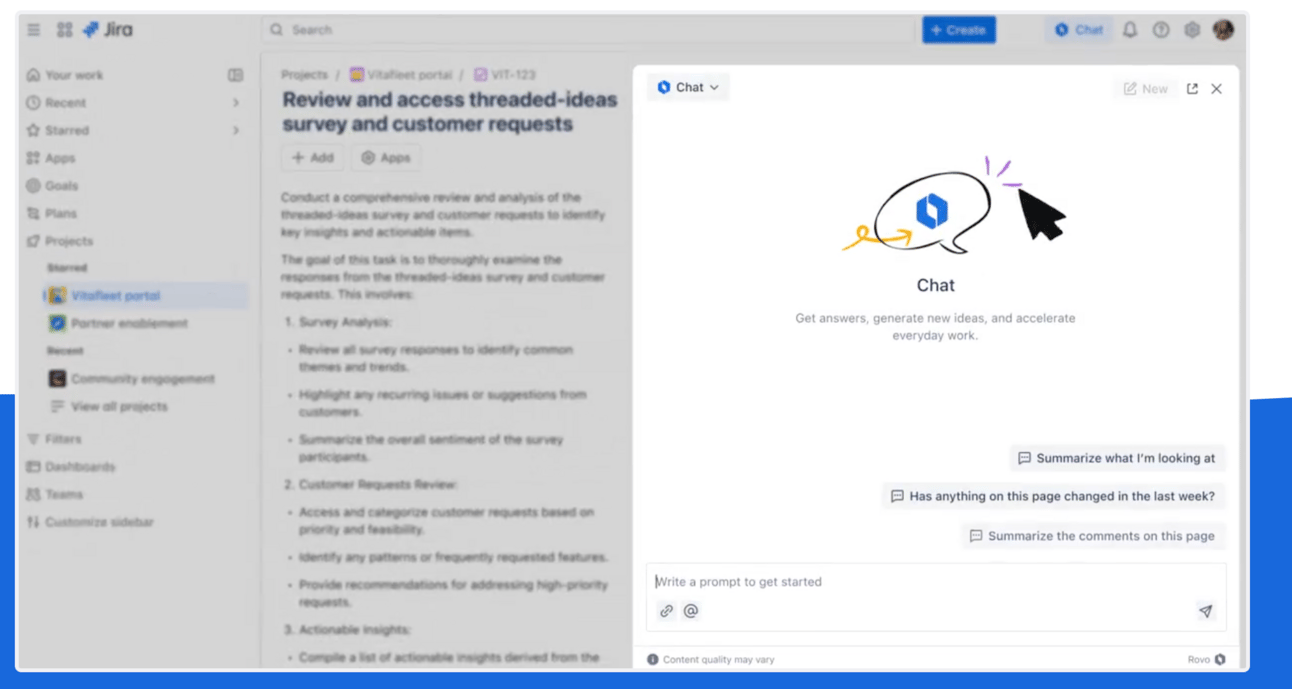
Welcome, AI Enthusiasts.
Atlassian has officially launched Rovo AI, an "AI teammate" that integrates smarter search, chat-based tools, and workflow automation across platforms like Jira and Confluence.
Javco has established itself as a leader in mission-critical infrastructure, specializing in future-proof data centers with a focus on innovation and sustainability.
In today’s issue:
🤖 ATLASSIAN
🦾 JAVCO
🛠️ AI PRODUCTS
🥋 AI DOJO
🤖 QUICK BYTES
Read time: 3.5 minutes.
LATEST HIGHLIGHTS

Image source: Atlassian
To recap: Atlassian has officially launched Rovo AI, an "AI teammate" that integrates smarter search, chat-based tools, and workflow automation across platforms like Jira and Confluence. Rovo Search pulls data from these tools and third-party services like Slack and Google Drive, while Rovo Agents can automate routine tasks such as drafting reports and generating OKRs. The system includes customizable agents, and the new browser extension allows users to interact with Rovo on any site. Additionally, Atlassian is introducing AI tools for developers, including code plan generation and pull request recommendations.
The details:
- Rovo AI Launch: Atlassian's AI teammate is now generally available, combining smarter search, chat, and automation for tools like Jira and Confluence.
- Rovo Search: Connects data from Atlassian tools and third-party apps like Slack, Google Drive, and GitHub for seamless search and task handling.
- Rovo Agents: Automate routine tasks (e.g., report generation, release notes), with customizable agents for specific workflows.
- AI for Developers: New features like code plan generation, pull request recommendations, and issue handling in Jira, streamlining development processes.
- Availability: Rovo is free for non-Atlassian users, expanding accessibility.
Here is the key takeaway: Atlassian has made its AI-powered assistant, Rovo, generally available, offering enhanced search, chat, and automation features for both Atlassian and third-party tools. Rovo's AI agents streamline routine tasks, and new developer tools optimize coding workflows, with the service now accessible to non-Atlassian users at no extra cost.

Image source: Javco
In Summary: Javco has established itself as a leader in mission-critical infrastructure, specializing in future-proof data centers with a focus on innovation and sustainability. Based in Montreal, the company delivers resilient solutions across Canada that adapt to evolving industry needs. Javco’s success stems from meticulous attention to detail, early stakeholder engagement, and a commitment to continuous improvement. A key example is their partnership with eStruxture, which has grown from local to national projects, showcasing their ability to scale while maintaining high standards. Javco's proactive approach positions them as a forward-thinking leader in the industry.
Key points:
- Javco's Expertise: Specializes in future-proof, resilient data centers and mission-critical infrastructure across Canada.
- Innovation & Sustainability: Focuses on adaptable designs to meet evolving industry needs, ensuring long-term durability.
- Attention to Detail: Engages stakeholders early and meticulously oversees every project phase to prevent challenges.
- Continuous Improvement: Applies lessons from past projects to maintain consistency and high standards.
- eStruxture Partnership: Long-standing collaboration that has grown nationwide, reflecting Javco’s ability to scale operations while delivering customized solutions.
- Proactive Approach: Javco anticipates industry changes and leads with innovation, shaping the future of mission-critical infrastructure.
Our thoughts: Javco's focus on resilience, adaptability, and continuous improvement sets them apart in the mission-critical infrastructure industry. Their customer-centric approach, involving all stakeholders early, ensures meticulous execution and high client satisfaction. Through innovation and a strong partnership with eStruxture, Javco scales without compromising quality, positioning itself as a leader in designing future-proof data centers that anticipate and address tomorrow's challenges. Their commitment to shaping change, rather than just reacting to it, highlights their forward-thinking vision in the evolving tech landscape.
TRENDING TECHS
🛠 Weights & Biases- Building the future of AI
🧾 ChainGPT-Unleash the power of Blockchain AI with ChainGPT
🤖 Coze- The easiest way to build AI bots
AI DOJO
Email Filtering
How AI-Powered Email Filters Work
1. Data Analysis:
- Historical Data: The filters analyze historical data from the user’s email interactions, including which emails were opened, replied to, marked as spam, or deleted.
- Content Analysis: The system scans the content of incoming emails, looking for keywords, phrases, and patterns that are typically associated with spam or promotions.
2. Categorization:
- Machine Learning Algorithms: AI algorithms, especially those using machine learning, are trained on large datasets to identify and classify emails into various categories, such as:
- Primary: Important messages that require immediate attention.
- Social: Updates from social media platforms and other social networking sites.
- Promotions: Marketing emails, offers, and newsletters.
- Spam: Unwanted or malicious emails.
3. Continuous Learning:
- User Feedback: The AI learns from user actions. If a user marks an email as spam or moves it to a different folder, the system adjusts its algorithms to refine future categorizations.
- Adaptive Algorithms: These algorithms can adapt to changes in user behavior over time, improving their accuracy and effectiveness.
4. Contextual Understanding:
- Natural Language Processing (NLP): AI uses NLP techniques to understand the context and intent behind email content, enhancing its ability to differentiate between legitimate and spam emails.
- Sentiment Analysis: The system can assess the sentiment of the email to gauge whether it might be of interest or not.
Benefits of AI-Powered Email Filters
1. Improved Productivity: By automatically filtering out spam and promotional content, users can focus on important messages without the distraction of irrelevant emails.
2. Enhanced Security: These filters help protect users from phishing attempts and malicious content by identifying potentially harmful emails before they reach the inbox.
3. User Customization: Users can fine-tune their filters by providing feedback, allowing for a more personalized email experience.
4. Time-Saving: AI reduces the time spent manually sorting through emails, allowing users to prioritize their communication and tasks more effectively.
5. Increased Engagement: By highlighting relevant emails, users are more likely to engage with important messages, which can improve communication and collaboration.
Challenges
1. False Positives: Occasionally, legitimate emails may be incorrectly classified as spam, which can lead to missed opportunities or important information.
2. Privacy Concerns: The analysis of email content raises privacy issues, as users may be uncomfortable with the extent to which their data is processed.
3. Dependence on Training Data: The effectiveness of AI filters relies heavily on the quality and quantity of training data, which can vary significantly across different user profiles and email behaviors.
Conclusion
AI-powered email filters, such as those used by Gmail, significantly enhance the email management experience by intelligently categorizing messages and reducing the clutter in users' inboxes. Their continuous learning capabilities and advanced natural language processing techniques contribute to improved productivity, security, and user satisfaction. As email remains a primary mode of communication, these AI-driven solutions are increasingly essential for navigating the complexities of modern digital correspondence.
QUICK BYTES
OpenAI recently launched Canvas, a new interactive feature for ChatGPT that provides a workspace for users to generate and edit text or code. This feature is powered by a fine-tuned GPT-4o model, enhanced using synthetic data to improve user interactions without relying on human-generated data. Other tech companies, like Meta, are also increasingly using synthetic data for model training, although this approach poses risks, including potential biases and inaccuracies in the generated data. As the cost of real-world training data rises, synthetic data may become essential for AI development, but careful curation will be crucial to avoid model degradation.
Zoom plans to introduce a feature that will create photorealistic AI avatars of users by translating recorded video clips into digital clones with synchronized audio. This tool, designed to enhance asynchronous communication among colleagues, aims to save time and boost productivity, according to Chief Product Officer Smita Hashim. However, there are concerns about the potential for misuse, especially regarding deepfakes. Unlike other companies that implement strict safeguards, Zoom's safety measures remain somewhat vague, though they include advanced authentication and watermarking.As deepfake technology proliferates and raises significant ethical concerns, especially in impersonation scams, questions remain about how effectively Zoom will prevent its tools from being exploited for malicious purposes. The custom avatar feature is set to launch in the first half of 2025 as part of a premium subscription service, amid ongoing regulatory efforts to address the challenges posed by deepfakes.
Basecamp Research Secures $60M to Create a 'GPT for Biology
Basecamp Research, a London startup, has raised $60 million to develop an AI agent focused on biology and biodiversity, aiming to generate insights beyond human capability. Co-founder and CEO Glen Gowers emphasized the data gap in current biological models, leading Basecamp to partner with over 100 organizations across 25 countries to gather primary-source data. Their foundational model, BaseFold, reportedly outperforms AlphaFold 2 in predicting protein structures. The startup is building its AI from the ground up, utilizing innovative data collection methods, and plans to use the funding to expand partnerships and enhance its models for applications like drug discovery. While Basecamp Research does not currently plan to create a consumer-facing product, it aims to address complex questions in the biopharma industry.
SPONSOR US
🦾 Get your product in front of AI enthusiasts
THAT’S A WRAP
